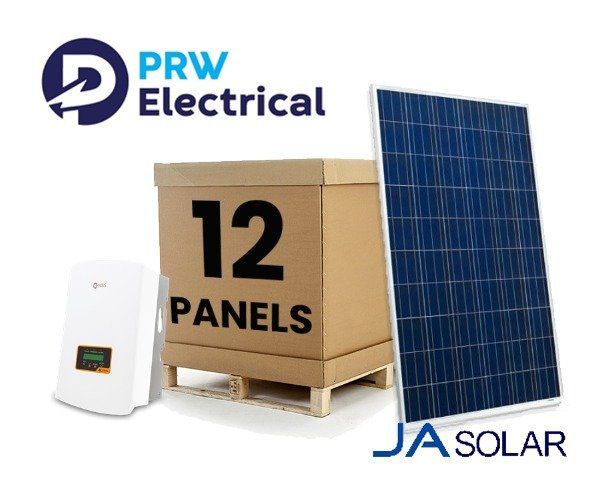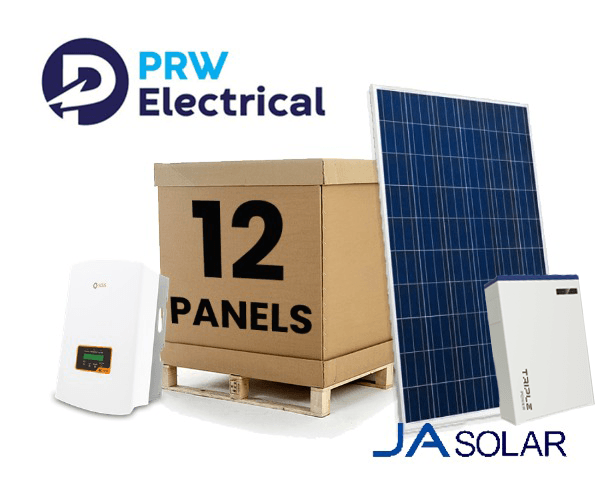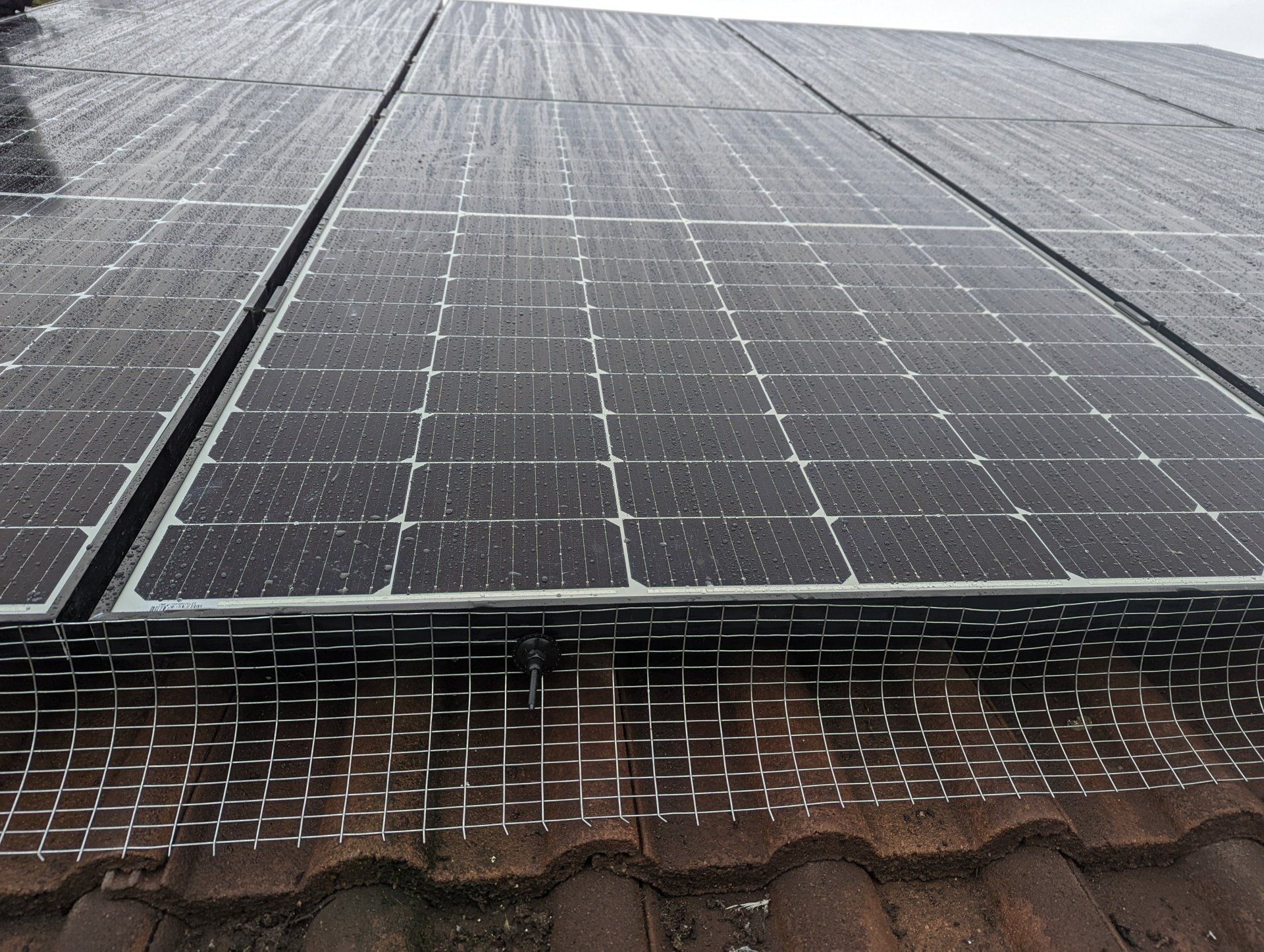
Solar Energy

Why PRW Electrical Services?
PRW Electrical Services have a wealth of experience within solar photovoltaic industry. Whether a single home installation or large volume social housing frame works - we have successfully delivered contracts of all sizes. We can offer real solution from design to product recommendations.
Why Us?
We assign a dedicated project manager who will ensure your installation is completed in a safe, efficient and timely manner. We use employed engineers to deliver, install and commission your solar panel system. On the day of the installation we arrive and erect our own scaffolding, complete all roof work, commission and collapse the scaffold system ensuring a smooth installation. In most instances this will take a single day.
How much do solar panels cost?
Choose The System To Match Your Budget

SOLAR PANEL INSTALLATION
Fully fitted from £7750
- 12x Ja Solar 410 Watt Panels
- Premium 4.5 Inverter
- Bird Grid Protection - Prevent bird nesting
- Full roof mounting installation system
- Full roof mounting installation system
No Hidden Charges!

SOLAR & BATTERY STORAGE
Fully fitted from £10500
- 12x Ja Solar 410 Watt Panels - 25 year warranty
- Solax Hybrid Inverter - 10 year warrenty
- Solax Battery 5.8kWh
- Bird Grid Protection - Prevent bird nesting
- Full roof mounting installation system
No Hidden Charges!




Free Quotation
Friendly & experienced engineers
Professional electronic reports
Dedicated project manager + 20 years panel warranty
Book Your FREE Survey?
The point of Solar Battery storage is to help you use more of the solar energy you’re creating. If you don't have battery storage, any excess electricity from solar power goes to the grid, which means you're generating power and providing it to other people without taking full advantage of the electricity your panels create.
When it comes to solar battery types, there are two common options: lithium-ion and lead-acid. Solar panel companies prefer lithium-ion batteries because they can store more energy, hold that energy longer than other batteries, and have a higher Depth of Discharge.
Also known as DoD, Depth of Discharge is the percentage to which a battery can be used, related to its total capacity. For example, if a battery has a DoD of 95%, it can safely use up to 95% of the battery’s capacity before it needs to be recharged.
Lithium-Ion Battery
As mentioned earlier, battery manufacturers prefer lithium-ion battery technology for its higher DoD, reliable lifespan, ability to hold more energy for longer, and a more compact size. However, because of these numerous benefits, lithium-ion batteries are also more expensive compared to lead-acid batteries.
Lead-Acid Battery
Lead-acid batteries (the same technology as most car batteries) have been around for years, and have been used widely as in-home energy storage systems for off-grid power options. While they are still on the market at pocket-friendly prices, their popularity is fading due to low DoD and shorter lifespan.
BATTERY CAPACITY - KWH
Battery size, also known as Capacity, is the maximum amount of energy in kilowatt-hours, that a battery can store at a given time. Some solar batteries such as the Growatt 3.3kWh are scalable. This means you can add more energy storage gradually, and increase your battery’s capacity over time. Solar batteries come in a range of capacities, the larger the battery capacity the more expensive the batteries tends to be. In the UK, the average household uses around 8-10 kWh of electricity every day. However, the capacity of storage your project will require all depends on your energy consumption. As a solar battery should never be fully discharged, the “useable capacity” indicates the truthful amount of energy a battery can store.
LIFECYCLE
A battery’s life cycle indicates the lifespan of a solar battery. Similar to a phone or laptop battery, a solar battery can only be fully recharged and emptied a certain amount of times. Therefore, the larger amount of lifecyles a solar battery is able to perform the better! As the average lifespan of Solar Panels is 15 years, ideally you would want an energy storage system that can match it. Many solar battery manufactures offer warranties that guarantee a certain level of performance after a certain number of cycles.
SUMMARY
The majority of solar batteries used in recent years have lithium-ion compositions, with this battery type being found in many everyday electrical appliances such as mobile phones, laptops, calculators and laser point printers. Whilst lead-acid batteries are still commonly used, the associated technology is far older than that of lithium-ion batteries. Accordingly, lithium-ion batteries operate more efficiently, with longer life spans, and provide greater depth of discharge.
For anyone looking towards a better-quality battery, Lithium-ion models are the suitable choice, however, lead-acid batteries can be appropriate in circumstances where bulk purchases and space allocation is not an issue.
Comprehensive solar batteries systems usually cost between £4,500 up to over £10,000, depending on a number of specification variables such as a battery’s energy capacity, brand, construction material, lifespan and the installation cost.
A Which? Survey conducted within the UK found that 25% of the participants paid under £3,000, alongside 41% paying between £4,000 and £7,000 for a battery storage system.
This survey did exclude the cost of solar PV in a number of cases, and when looking to get the best deal it would be financially wise to consider purchasing a solar panel and battery system at the same time.
Whilst this will be beneficial, it does not prevent the possibility of finding a great deal for a solar battery as a purchase.








